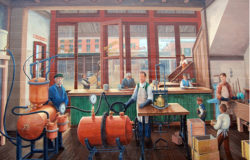Joseph Biedenharn
Monroe's Joseph Biedenharn was an internationally successful entrepreneur who revolutionized the soft drink industry and founded Delta Air Lines.

Courtesy of Biedenharn Coca-Cola Museum
Biedenharn Candy Company Mural. Dafford, Robert (Artist)
A candy merchant from Vicksburg, Mississippi, Joseph Augustus Biedenharn revolutionized the international soft drink industry when he began to bottle Coca-Cola in 1894 and ship it into rural areas. Creating a network of franchised bottlers with other family members, he moved his operations to Monroe, Louisiana, in 1913. Biedenharn became a prominent regional businessman—in addition to his Coca-Cola bottling enterprises, he was co-owner of the early fleet of crop-dusting and mail-carrying airplanes that would become Delta Air Lines—as well as a civic leader and philanthropist.
Of German descent, Biedenharn, born on December 13, 1866, was the oldest of eight children born in Vicksburg to Herman Henry Biedenharn and Louisa Wilhemine Lundberg. His father and uncle owned a two-story brick building near the Mississippi River in Vicksburg’s business district, operating a shoe store on one side and a candy business on the other. At fourteen years old, Biedenharn quit school in order to work full time in his father’s candy shop, which featured a soda fountain as well as confections. He started out bottling soda water and flavored soda drinks, then expanded to Coca-Cola as the demand for the beverage at his soda fountain increased. Coca-Cola had been invented by a pharmacist in Atlanta in 1866, but it was only sold at soda fountains until Biedenharn installed bottling machinery at his store and began to sell it by the case at farms and lumber camps throughout the region.
He often recalled his father’s advice: “Son, go into the nickel business. Everybody’s got a nickel. People will spend a nickel, but they will hold on to a dime.” Biedenharn priced his bottles of Coca-Cola at five cents apiece. In her family memoir, his daughter Emy-Lou Biedenharn recounted his early experiences promoting the bottled drinks in the countryside:
“Joe felt the urgency to go on the road in order to sell his new nickel beverage to new people in new territory. This tall, eager young salesman worked his Mississippi territory with horse and buggy. He traveled long, dusty country roads where chickens scratched in the dust on hot summer afternoons. The iron rims of his buggy wheels grated on the hard clay ruts, while Joe let his old mare jog along at her own even pace. On these trips he carried an old-fashioned horn with a rubber ball similar to ones used on early automobiles. As he approached the country stores, he squeezed forth a humorous ‘honk, honk.’”
The bottling business in the rear of the candy store was labor intensive. Each bottle was washed by hand and disinfected. Fifty to one hundred bottles could be filled in an hour. The advent of carbonation brought with it the challenge of bottling the carbonated drink without blowing up the glass bottle. Early distribution of the bottles was on dirt roads by horse and carriage to farmers and small grocery stores. According to Biedenharn’s nephew, A. Leland Gwinn of Shreveport, family members were known to buy establishments that didn’t sell Coca-Cola so that they could offer the drink there and spread its popularity.
Biedenharn’s business plan was ahead of its time, and markets grew successfully. In 1913 he moved to Monroe and began producing Coca-Cola at a small bottling plant that he purchased there. In time, he and his brothers William, Harry, Lawrence, Herman, Ollie, and Albert and sister Katie acquired franchises to bottle Coca-Cola in Shreveport and Monroe, and in Texarkana, Wichita Falls, San Antonio, Temple, and Uvalde in Texas, as well as in Mississippi and Arkansas. The enterprise is commemorated at the Biedenharn Home and Gardens in Monroe, where a museum features a restored soda fountain, vintage Coca-Cola signage, a delivery truck, and other memorabilia.
In 1925 Biedenharn and other entrepreneurs purchased Huff Daland Dusters, which moved from Macon, Georgia, to the cotton fields of northeastern Louisiana. Eighteen planes—the largest privately owned aircraft fleet in the world at that time—grew to twenty-five. Since the crop-dusting company had income only in the summer months, operations in nonproductive months shifted to Peru, where the seasons are reversed. The company eventually grew into Delta Air Lines, which operated out of Monroe before it moved to Atlanta in 1941.
Biedenharn was a vital part of his community. As a city commissioner, he paved the first streets in Monroe and helped transform Forsythe Park from a fairground to the park it is today.
Biedenharn was married to Anne Schlottman, who died in 1936. They had four children: Henry, Malcolm, Emma Louise (“Emy-Lou”), and Bernard. Joseph Biedenharn died on October 9, 1952, and is buried at Riverview Cemetery in Monroe.
